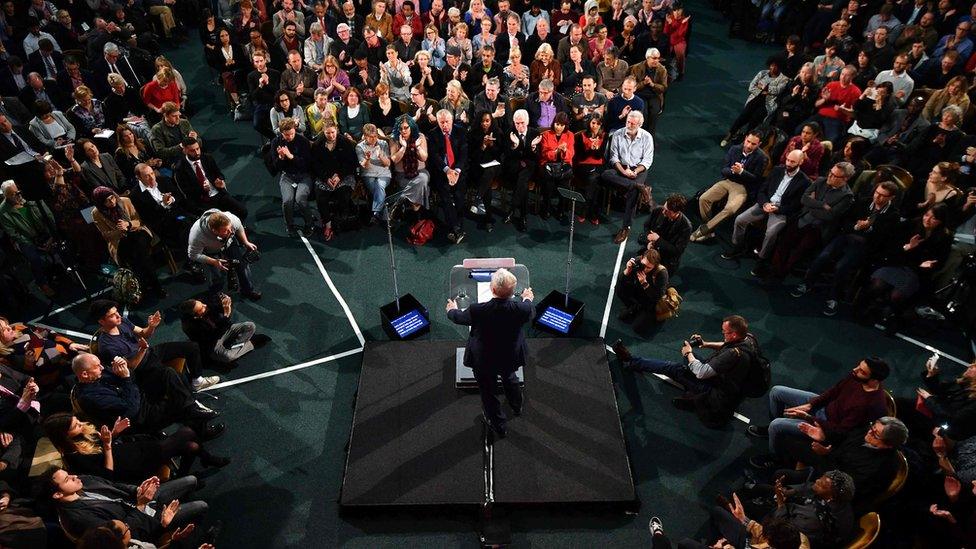Corbyn enters campaign mode
- Published

Jeremy Corbyn provided two very big clues today to how he will fight the campaign - and for two main reasons.
First, he is opting to have the clearest dividing lines between government and opposition in more than three decades - ever since Labour pledged to scrap nuclear weapons and leave the EU in 1983.
He suggested the Conservatives were "morally bankrupt" and attacked the elites.
But he is also drawing a clear line between his leadership and his party's New Labour past.
He didn't just attack the "fat cats" and the "tax dodgers" - he denounced the "wealth extractors" of big business and the City - and took a pop at the media while he was at it.
What was interesting was that uncensored, unvarnished Corbyn was more passionate and fluent than in many of his much-criticised performances in the Commons.
Now, one reason we will see more of this approach in the next seven weeks is that necessity is the mother of re-invention.
Door knocking
Trailing in the polls by as much as 20%, it's essential that Jeremy Corbyn shores up his eroding core vote - and the messages he delivered were well received by party supporters.
But there's another reason.
For some time, his strategists have wanted Jeremy Corbyn to adopt more of a (for want of a better term) "leftwing Trump" demeanour - railing against rigged systems, putting the people before the powerful, defining his enemies.
He appears to be taking their advice now - in part to grow Labour's vote by trying to appeal to those turned off by conventional politics, but in part to encourage new party members who joined to support him to go out and knock on doors, rather than practising armchair socialism by sitting at home and simply filling out a leadership ballot paper and leaving him to do the rest.
Expect lots of policy announcements in this election - in his first major speech today, Jeremy Corbyn reiterated his pledge of a £10 an hour minimum wage - but the announcements will be within a narrative of standing up for the people against the establishment rather than a series of apparently unconnected "retail offers" for which his predecessor received criticism in 2015.
At stake is of course the future of the country.
Same language
But also at play is whether Mr Corbyn can decisively move his party to the left.
Even an election defeat - but with better than expected result - could keep him in place until his party's conference in September when he could potentially oversee leadership changes which would make a left wing successor more likely.
So he is doing what he has so far done best. Campaigning.
It's no mistake he is using some of the same language he deployed in his two successful bids to lead his party: "Things can and they will change" and "don't take what you are given" are familiar refrains for those who attended any of his leadership rallies.
But it's self-evident that winning over undecided voters is a different task from being applauded by loyal Labour leftwingers.
As one of his MPs put it: "The Corbyn experiment will be put to the test. Tested to destruction, if necessary."
If Labour lost the last election - as many of Mr Corbyn's backers believe - because it wasn't leftwing enough, it seems clear it won't be following that path this time.